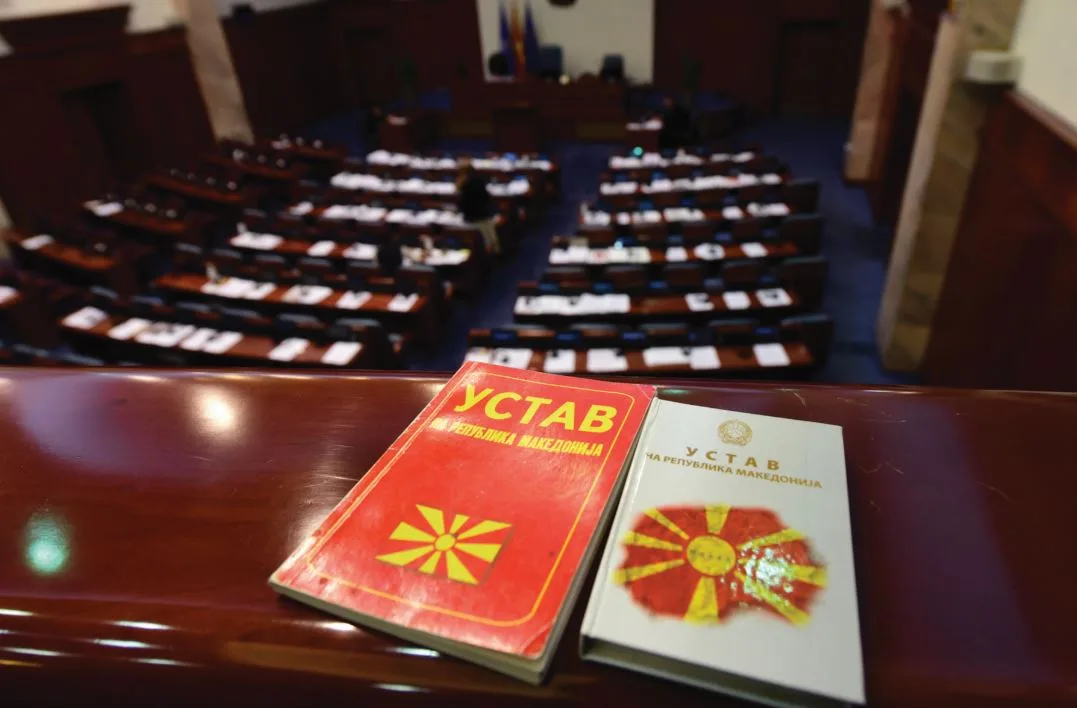After a year-long debate on the period when the country should start the procedure to amend the Constitution, which will include Bulgarians in the basic law as part of the people of Macedonia, a parliamentary session was held on the said topic. The proposal to include the amendment in the Constitution of Macedonia, as proposed by government, was put on the agenda, seeing support of 70 MPs, but given that amendments shall be passed by a two-thirds majority, the government still lacks 10 votes to move forward so they will keep working to seal the required majority.
Prime Minister Dimitar Kovačevski was the first to address legislators, explaining the need for changes to the Constitution. He once again called on the Assembly to pass the amendments regarding Macedonia’s accession to the EU if the country really wants to become an EU member by 2030, noting that the proposal to amend the Constitution was drafted in Skopje, based on the French agreement of 2022 and supported by the EU and NATO. He mentioned that the main opposition party, VMRO-DPMNE, and its partners are scaring the people with all kinds of disasters, while the amendments are only about adding new nations of North Macedonia to the constitution. The constitutional amendments do not threaten the identity of the Macedonians, Kovačevski emphasized, clarifying that the day has come when it will be clear who truly stands for the EU and who doesn’t. He also explained why Macedonia should follow the path to the EU, noting that there will be no new veto. There are no new requirements, and bilateral issues are not an obstacle and will not be associated with the implementation of common standards. To this end, the Republic of North Macedonia has drafted the relevant constitutional amendments to include in the Constitution the citizens who live in the country and are part of other nations. He proposed that in addition to the Macedonian people, as well as citizens of the Republic of North Macedonia who are part of the Albanian, Turkish, Vlach, Serbian, Roma, and Bosnian peoples, citizens who are part of the Bulgarian, Croatian, Montenegrin, Slovenian, Jewish, and Egyptian descent, should be added as well.
After the Prime Minister’s address, a debate kicked off. “We cannot make a catalog from the preamble to the Constitution, for Macedonia, the road to Brussels should not pass through Sofia, we defend and must defend the Copenhagen criteria because if we accept the path to the EU with special criteria and precedents, it will bear consequences for the following candidate countries. Instead of constitutional amendments, we should talk about early elections because this government is completely delegitimized,” said lawmaker with the opposition VMRO-DPMNE, Gordana Siljanovska. She spoke of the right to non-interference in internal affairs, which is also a European right, referring to the principles of the EU Charter that guarantee it, as well as the protection of the rights of national minorities, cultural heritage, and ethnic identity.
Jovan Mitreski, the coordinator of the ruling SDSM’s parliamentary group, said that the constitutional changes pose no threat, instead paving the way for the country to join the EU. “The state must move forward. EU membership as a strategic goal remaining after independence was not set by chance. After 17 years in the waiting room, 11 years of isolation, last year we started negotiations with the EU. With the adoption of constitutional amendments, we are continuing the European path so this is a historic opportunity for which we have strong support from our US and EU partners,” Mitreski said.
The President of North Macedonia’s Assembly, Talat Xhaferi, interrupted the hearing of constitutional amendments and suggested that it be postponed. This happened after the debate was over. The coordinator of the VMRO-DPMNE parliamentary group, Nikola Micevski, appealed to Xhaferi not to shut the meeting down but to immediately put the amendments issue to a vote.
However, the ruling coalition sensed during the debate that they were failing to secure the required two-thirds of the votes to pass constitutional amendments so they chose to postpone the vote until later. If no consensus is found with the opposition ahead of the vote on the amendments that are part of Skopje’s commitment to Brussels regarding further movement towards EU membership, this will obviously provoke a crisis which could most likely be resolved only through snap parliamentary elections. Such a scenario would fit best the country’s opposition parties, who believe they have a good chance of winning. It can be foreseen that in the event of their victory, they will make a U-turn on their position regarding constitutional amendments as it will be their own government coalition who will further pursue their country’s goal to become part of the EU.
The latest developments were on the agenda of talks between the Prime Minister of North Macedonia, Dimitar Kovačevski, and European Commission President Ursula von der Leyen during the EU-Western Balkans Summit in Athens. The parties discussed the importance of successfully completing the process of passing constitutional amendments for the country’s further European integration. It was emphasized once again that for Macedonia’s EU membership, it is important not to miss out on this opportunity. Brussels gave a full green light to Macedonian authorities on constitutional amendments, however, whether this will affect the current stance of the opposition remains rather doubtful.



